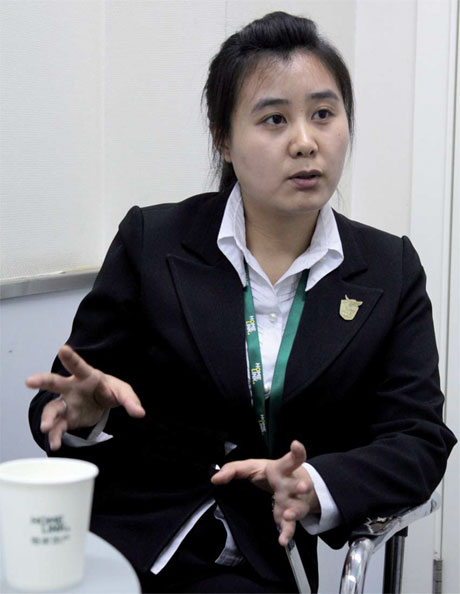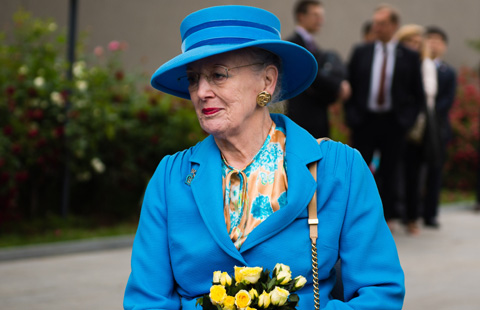Land of opportunity for farmer's daughter
Updated: 2014-04-25 07:28
By Joseph Catanzaro (China Daily Europe)
|
|||||||||||
|
Hu Jinjuan sells an average of two homes in Beijing each month. Wang Zhuangfei / For China Daily |
The property agent
On a bustling Beijing footpath, sharply dressed young men and women assemble in a formation three ranks deep, standing at attention with backs straight and eyes fixed forward.
At 9.30 am on the dot, in absolute unison, they raise their voices in song.
"I promise I will strive for excellence and have no fear of difficulty," they sing in Mandarin. "We need to cooperate with each other and work together to make a brighter future."
It's Hu Jinjuan's favorite stanza of the Homelink ode, the song that all company employees sing to inspire them for a day of selling real estate in Beijing's property market.
"The lyrics are about our dedication and achieving our hopes and dreams for the future," she says.
Hu, 28, is a migrant worker from Hebei province who grew up in a small village only a few hours drive from Beijing.
Not that long ago, her dreams and the nearby capital city both seemed impossibly far away and out of reach.
"My hometown is warm and friendly, but very poor," Hu says. "Even though it's getting better now, there is no industry, and very few opportunities for young people. Many people there think there is no need for a woman to study, that they should just stay home and look after the family."
Last year, Hu was named the top selling real estate agent at Homelink, the company that sells 52 percent of Beijing's resale homes.
Her personal journey, from poor farmer's daughter to promising professional with a property portfolio, is one thread in the greater narrative that is the changing life of the Chinese worker.
In many ways, China's booming real estate industry itself embodies the nation's rapid change, says professor Zeng Xiangquan, head of the school of human resources at Renmin University of China in Beijing.
Real estate is one of the new and emerging industries that epitomizes the evolution of the Chinese economy, and the changing lot of workers, he says.
In the decades before 1980 - the year when the government opened China up to the world - land and property was owned by the state or by collectives.
Selling real estate was a profession that did not exist.
"The real estate industry didn't boom until the period of urbanization and commercialization," Zeng says.
By 2010, the same year Hu began working for Homelink, China's property market had reportedly become the biggest in the world.
Last year, real estate investment accounted for 15 percent of the nation's GDP, and the total value of new homes sold was 6.8 trillion yuan ($1.1 trillion, 796 billion euros) according to China's National Bureau of Statistics.
Hu says she owes her own personal growth to her parents, who went against the grain in their conservative hometown and saved up enough to pay for part of their daughter's bachelor's degree in law at Hebei University of Economics and Business. A scholarship for academic excellence covered the rest of her tuition.
There is passion in her voice when she talks about gender equality, and her strong belief women can have a rewarding career as well as children.
"I think we have to encourage women to work hard and achieve their goals," she says.
Hu scored her job with Homelink through an online recruitment agency after following her boyfriend to Beijing, where he had taken a job teaching.
The couple are now married and rent an apartment together near her office.
Hu does about a 12-hour shift on any day the job requires.
She is coy about revealing exactly how much she makes, but lets slip that she recently purchased two apartments in Hebei, and that she is paid a base rate of 5,000 yuan a month. Commissions typically range from 1.5 percent to 3 percent of the sale value. She concedes she makes more in one month than her parents earn farming in an entire year.
"In the last year, I sold 22 homes." she says. "I sell about two homes a month, now."
In the area around her office, Anyuan, apartments go for about 40,000 to 50,000 yuan per square meter.
"Fully furnished could go for around 70,000 yuan or higher. If it's inside the Third Ring Road (inner city), or near a school, it could be 100,000 yuan per square meter."
Hu says buying property in China has some unique quirks.
People with Beijing hukou (residency rights that entitle the holder to social welfare benefits like education and healthcare) are allowed to own two properties in the city, she says. People who do not have Beijing hukou are allowed to own one property in the city. The rules vary slightly between different cities and provinces.
Subsequently, most of the property Hu sells in the capital is to first homebuyers, or locals who have outgrown their current home and want to upgrade. Her daily work inadvertently provides a demographic snapshot of Beijing.
"Over 50 percent of customers buy a home to live in.
"Most buyers are generally 35 to 50 years old, and have a child and elderly parents who live with them. They are mostly buying because they have outgrown their old home. The other category is people who want to buy to be near a good school for their children. And then there are those who have just got married, or parents buying a place for their children after they graduate from university so they can work in Beijing."
People trading up usually want a three-bedroom, 120-150 sq m apartment with two bathrooms.
First homebuyers are generally looking at a 50-80-sq m apartment with a single bathroom.
Hu says the volume of sales and prices have both gone up sharply in the past two years, although recent data from property agents Centaline suggest that overall, Beijing's second-hand home sales last month fell to the lowest levels for March since 2009. Compared with February sales, Centaline also found the average price per square meter had fallen 0.6 percent to 31,400 yuan.
Even though these and other recent figures suggest prices are cooling somewhat, nationally, Hu says buying is still a stretch for many Chinese.
"Those born in the 1980s and 90s mostly cannot afford the deposit alone," she says. "The parents usually pay the deposit. If one person buys a home, they are usually using the savings of their whole family."
For a first home, Hu says the deposit is 30 percent of the evaluated value of the property. For a second home, the deposit is 70 percent of the price, or 60 percent if the buyer has a good credit history.
Hu says her life has changed dramatically in lockstep with her increased income, but she does not have a lot of time to indulge in hobbies like watching movies and shopping, because she is focused on her career.
She saves most of what she earns.
Her company recently sent her on her first overseas trip, a holiday to Singapore, as a reward for good performance.
In the next few years, Hu hopes to have a child. She plans to eventually buy an apartment in Beijing, so her little one can be educated in the capital.
"I am so grateful to my parents for helping me fulfill my dreams," she says. "I want to help my children follow their dreams, too."
Last year, Hu received an award from her company during a ceremony held at the Great Hall of the People. Her elderly parents traveled to Beijing for the first time in their lives to see their daughter honored.
Standing outside China's seat of government, she says it hit her how much her life had changed.
"My parents came with me to the Great Hall of the People," Hu says. "For the first time, I really believed I can really make life better for my parents."
One of the houses Hu recently bought back home in Hebei is for her mother and her father.
Xie Wenjia contributed to the story.
josephcatanzaro@chinadaily.com.cn
(China Daily European Weekly 04/25/2014 page10)
Today's Top News
EU: No armed intervention in Ukraine
Chinese premier visits Nigeria
Court to rule on Yingluck in Thailand
Travellers to Malaysia drop
Chinese to US grad schools drop
Ukraine moves special forces to Odessa
Slovenian PM resigns
Disclosure of military secrets becoming bigger risk
Hot Topics
Lunar probe , China growth forecasts, Emission rules get tougher, China seen through 'colored lens', International board,
Editor's Picks

|

|

|

|

|

|






